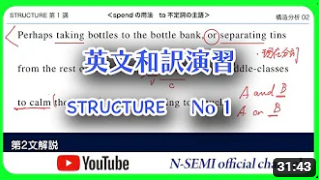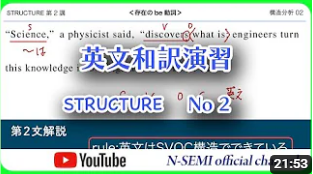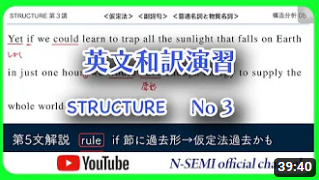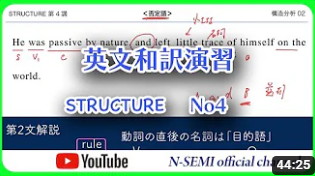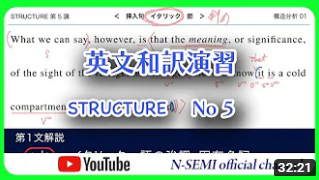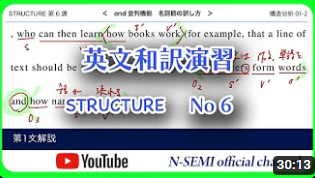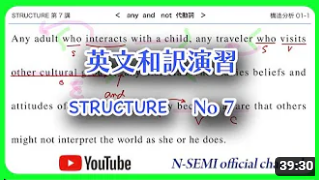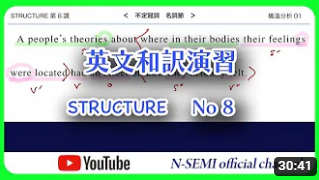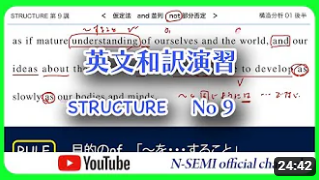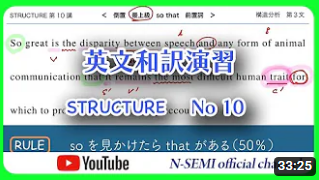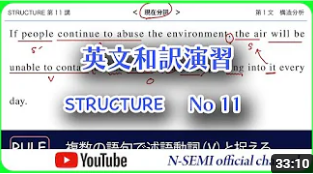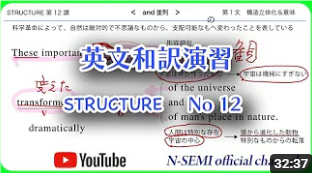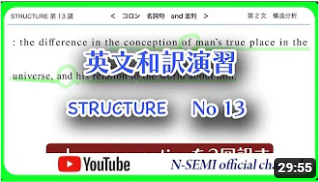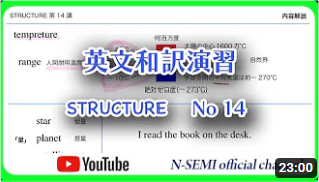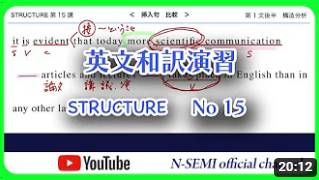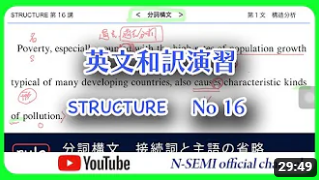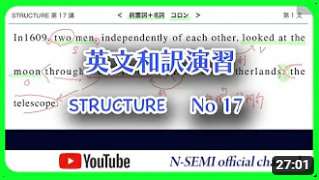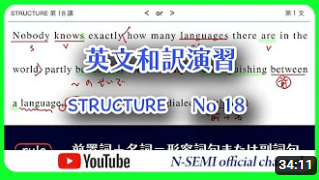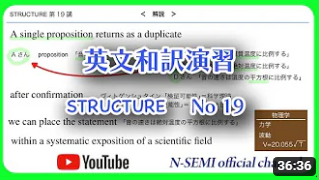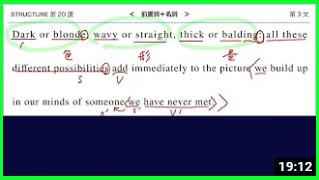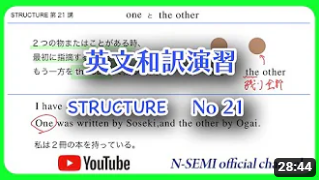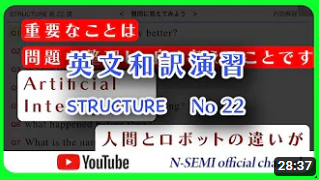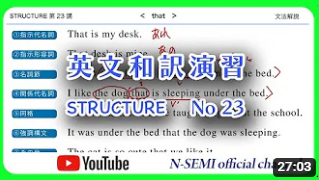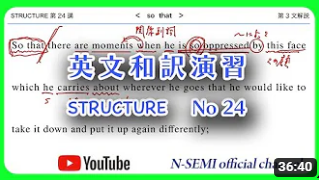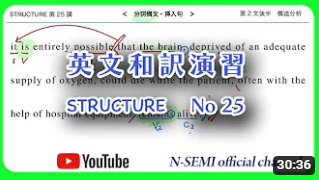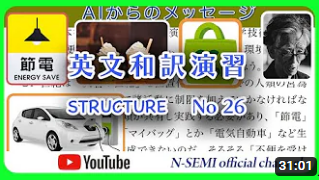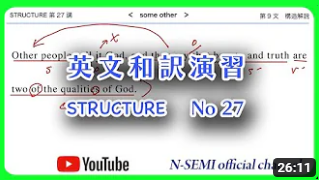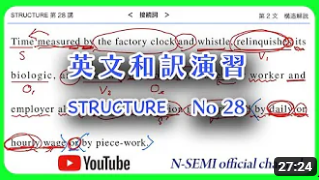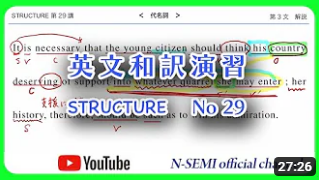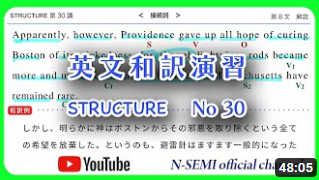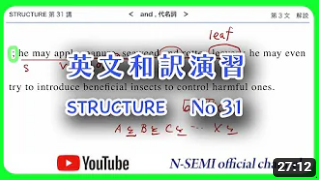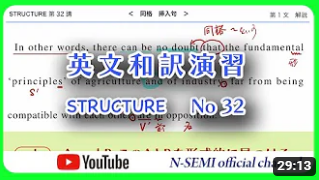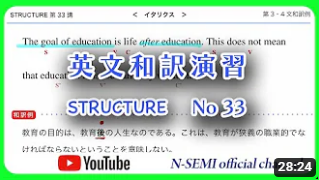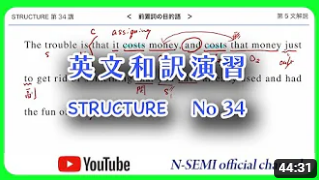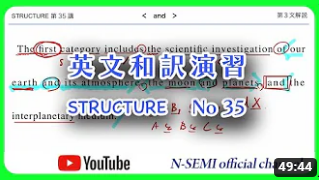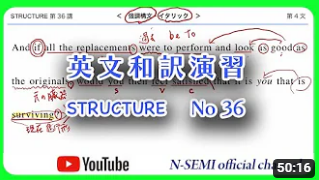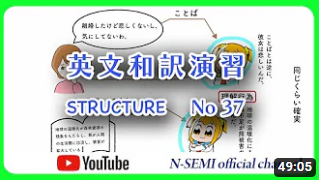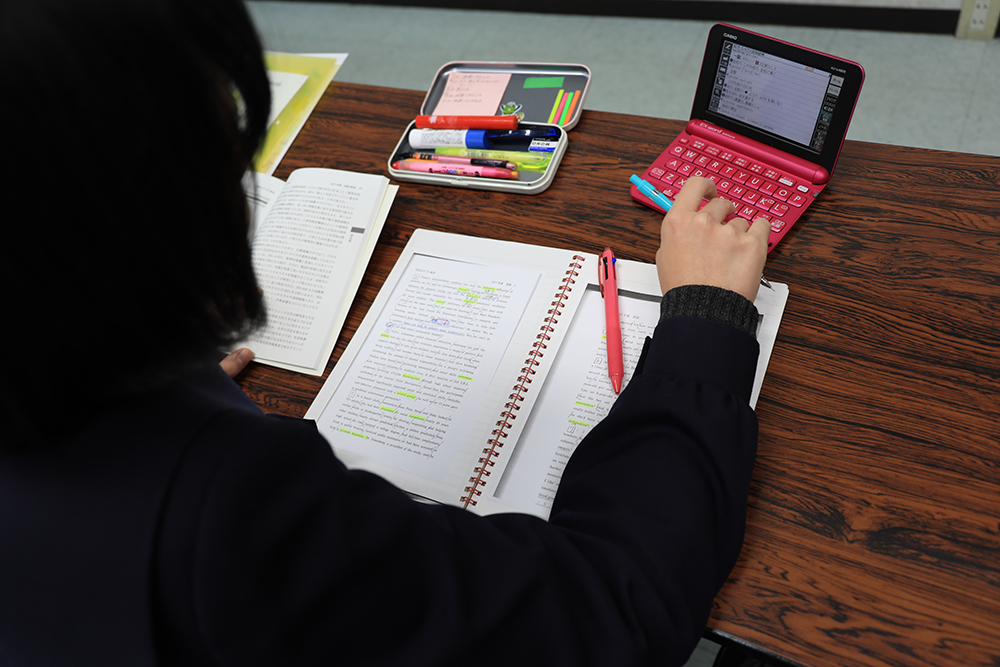
英文和訳基礎演習
英語を得意教科にしよう!
英文は英単語の知識だけでは読めません。
英文法を駆使した読解法を習得してください。


問題用紙を
ダウンロードしよう!


印刷して
問題を解いてみよう!


問題を解いたら
動画を見て解説を
聞こう!
Let’s 英文和訳演習!
Of all environmental virtues, the reuse of rubbish is the easiest to win people's enthusiasm for.
Perhaps taking bottles to the bottle bank, or separating tins from the rest of the rubbish, is a way for the middle-classes to calm their guilt about consuming too much. Certainly, people are amazingly willing to spend time sorting out their rubbish and taking it to the right place.
Only engineers can harness the extraordinary advances being made by scientists. "Science", a physicist said, "discovers what is; engineers turn this knowledge into things that have never been." And so it is the engineers who are best equipped to know which breakthroughs in science and technology can be brought to production today and which ones might be to production tomorrow.
Almost all energy on Earth comes from the sun. Even the fossil fuels were produced originally by the heat of the sun. Unlike these non-renewable fuels, the sun's energy is limitless. It might sometimes seem as if the sun doesn't come out very much. Yet if we could learn to trap all the sunlight that falls on Earth in just one hour, we would have enough energy to supply the whole world with fuel for a year.
To his mother Rachel had always seemed the least probable of Gregory's girlfriends. He was passive by nature, and left little trace of himself on the world. Rachel was small and fierce. She not only knew her own mind, she knew other people's as well, especially Gregory's. His mother had heard about the attraction of opposites, but still did not give the relationship long.
What we can say, however, is that the meaning, or significance, of the sight of the refrigerator changes once we know it is a cold compartment in which to store food. Without this knowledge, the sight of a refrigerator may signify nothing more than a shiny surface or a large rectangular object.
Most people recognize the importance of reading stories to small children, who can then learn how books work (for example, that a line of text should be read from left to right), how letters form words and how narrative flows. But literacy is only one benefit of storytelling. Another is the chance for children to identify with fanciful characters who try to work out conflicts with others and within themselves.
Any adult who interacts with a child, any traveler who visits other cultural groups, any historian who studies beliefs and attitudes of the past immediately becomes aware that others might not interpret the world as she or he does. Even peers from the same culture are confronted with these issues, such as when communication fails or when one person misunderstands another. When we make such observations, we often say the others have different concepts from us; this sort of statement is especially common in discussions of children.
A people's theories about where in their bodies their feelings were located had an effect on how they actually felt.A people who, like ourselves, regard blushing with shame as something that happens in one's face do turn red when they are embarrassed.
Unfortunately, too many parents want their children's minds to function as their own do — as if mature understanding of ourselves and the world, and our ideas about the meaning of life, did not have to develop as slowly as our bodies and minds.
The ability to speak is the most characteristically human of all human attributes. Philosophers since the ancient Greeks have pointed to language as the most significant feature that separates us from the beasts. So great is the disparity between speech and any form of animal communication that it remains the most difficult human trait for which to provide an evolutionary account.
If people continue to abuse the environment, the air will be unable to contain all the smoke and gases pouring into it every day. The streams, lakes, and oceans will be unable to accept the industrial and human waste products. Garbage will destroy our living space. The only home in the solar system that seems suitable for human life will have become unfit for humans or animals.
These important shifts in cultural outlook dramatically transformed the conception of the universe and of man's place in nature. The belief that the universe is a machine and that it might contain other worlds like the earth threatened traditional assumptions about the uniqueness of man, leading to a denial of the doctrine that the universe had been created for the benefit of man.
There is nothing which divides the East and the West so fundamentally as this difference of mental attitude: the difference in the conception of man's true place in the universe, and his relation to the world about him. If we want to seize this difference, we shall find it expressed in art.
Our human bodies can survive and function only within very narrow bounds. Tolerable temperatures range only over about 50 degrees centigrade, and even that is tolerable only with suitable clothing. But the temperatures in nature range from very near absolute zero (-273 degrees centigrade) to many millions of degrees in the center of stars.
Whatever the historical details and whether or not English retains its premier position for very long into the future, it is evident that today more scientific communication — articles and lectures — takes place in English than in any other language in the world.
Poverty, especially coupled with the high rates of population growth typical of many developing countries, also causes characteristic kinds of pollution. These problems tend to be localized, although they affect large numbers of people. Today's concerns about the global environment are a response to the massive scale on which modern technologies are now used and the certainty that they will spread to the developing countries in the years ahead.
In 1609, two men, independently of each other, looked at the moon through a new invention from the Netherlands: the telescope. The first man, in July 1609, was Thomas Harriot of London, an accomplished mathematician and astronomer. The other man, several months later, was Galileo, a forty-fiive year-old professor of mathematics at the university of Padua. Luckily, we have some record of what each of these two men thought he observed, and it is instructive to compare their private notes, if we are to understand the reasons for the great differences between them. Of course, both men knew that from the time of Alistotle the moon was thought to be a perfectly smooth sphere made of a celestial substance, the symbol of the incorruptible universe beyond Earth.
Nobody knows exactly how many languages there are in the world, partly because of the difficulty of distinguishing between a language, and sub-languages or dialects within it. But those who have tried to count usually end up around the 5,000 mark. And many of these languages appear remarkably different from one another, so much so that some early linguistic researchers claimed that languages could differ from each other without limit and in unpredictable ways.
One of the requirements for this kind of life is the sameness of a meaning that we communicate among ourselves and come back to repeatedly in our own cerebral life. A single proposition returns as a duplicate over and over again. We tell it to other people or quote it as having been said by someone else, and we can place the statement within a systematic exposition of a scientinc field after confirmation. The sameness of a meaning occurs with the varying interpretations people might give the meaning, and with the differenves in vagueness and differences the proposition might enjoy in various minds.
There are few things more distinctive about a person than their hair. It is one of the very first features we ask for in any description of a new baby, a stranger or a wanted criminal. Dark or blonde, wavy or straight, thick or balding: all these different possibilities add immediately to the picture we build up in our minds of someone we have never met.
For better or worse, there is no doubt that English is now a world language. It is also of course a rapidly changing one, and no one can predict how it will develop. It seems likely, however, that there will be movement in two directions: on the one hand, towards greater standardization of English used as a shared means of communication in international contexts; and on the other, towards varieties of English which are only used, or understood, within particular countries or communities.
Most people would find the picture of our universe as an infinite tower of tortoises rather ridiculous, but why do we think we know better? What do we know about the universe, and how do we know it? Where did the universe come from, and where is it going? Did the universe have a beginning, and if so, what happened before then? What is the nature of time? Will it ever come to an end? Recent breakthroughs in physics, made possible in part by fantastic new technologies, suggest answers to some of these longstanding questions.
One of the biggest problems with modern computers is that they follow all commands mechanically. Computers do what they are told are told to do, whether we meant it or not. Moreover, they cannot turn themselves on, nor can they ever begin something entirely new on their own.
If he looks honestly at the result it is time that convinces him, time that tells him, "You must accept this, for I have preserved it." Yet what time preserves is not what he would have liked to preserve. So that there are moments when he is so oppressed by this face which he carries about wherever he goes that he would like to take it down and put it up again differently; but only death can do that.
The crucial issue is whether the essence of life resides in the heart or in the brain. Because the body rarely shuts down all its systems at once, and because hospitals have access to the most modern life preserving machinery, it is entirely possible that the brain, deprived of an adequate supply of oxygen, could die while the patient, often with the help of hospital equipment, remains alive.
The relationship between man and his world has suddenly altered in recent years. Until recently man seemed so insignificant in relationalship to the world that he felt that nothing he did would make any difference to the natural order of things. It was probably the development of the atomic bomb and the realisation that he had in his power a means of destroying the whole world that awoke man to his responsibilities.
Truth is one value. Another is beauty. The scientist's concern is truth, the artist's concern is beauty. Now some philosophers tell us that beauty and truth are the same thing. They say there is only one value, one eternal thing which we can call x, and that truth is the name given to it by the scientist and beauty the name given to it by the artist. It is possible to say that the scientist examines x in one way, the artist examines it in another. Beauty is one aspect of x, truth is another. But what is x? Some people call it ultimate reality - the thing that is left when outward appearances are removed. Other people call it God, and they say that beauty and truth are two of the qualities of God.
In an industrial community, when the factory clock takes over, the work day is even less subject to seasonal variation, particularly when steam power compensates for or replaces the seasonal irregularities of water power. Time measured by the factory clock and whistle, relinquishes its biologic, and becomes the coinage, money for worker and employer alike, whether the relation is determined by daily or hourly wage or by piece-work.
But our history teachers were not content that we should get our facts right; our opinions had to be right as well. Right opinions in this connection means patriotic opinions. It is necessary that the young citizen should think his country deserving of support into whatever quarrel she may enter ; her history, therefore, should be such as to win his admiration.
When Benjamin Franklin invented the lightning-rod, the clergy, both in England and America, condemned it as an impious attempt to defeat the will of God. For, as all right-thinking people were aware, lightning is sent by God to punish impiety or some other grave sin — the virtuous are never struck by lightning. Therefore if God wants to strike anyone, Benjamin Franklin ought not to defeat His design, indeed, to do so is helping criminals to escape. But God was equal to the occasion, if we are to believe the eminent Dr. Price, one of the leading devines of Boston. Lightning having been rendered ineffectual by the 'iron points invented by the sagacious Dr. Franklin', Massachusetts was shaken by earthquakes, which Dr. Price perceived to be due to God's wrath at the 'iron points.' In a sermon on the subject he said, "in Boston they are more erected than elsewhere in New England, and Boston seems to be more dreadfully shaken. Oh! there is no getting out of the mighty hand of God.' Apparently, however, Providence gave up all hope of curing Boston of its wickedness, for, though lightning-rods became more and more common, earthquakes in Massachusetts have remained rare.'
The fundamental concept of growing 'organically' is that the farmer uses practices that are in harmony with nature, and avoids the use of chemicals that may become part of our food with unknown consequences. For example : the grower may simply plough the land and leave it, even tolerating weeds, depending entirely on the natural fertility of the soil; he may apply manure, seaweed and rotten leaves; he may even try to introduce beneficial insects to control harmful ones.
In other words, there can be no doubt that the fundamental 'principles' of agriculture and of industry, far from being compatible with each other, are in opposition. Real life consists of the tensions produced by the incompatibility of opposites, each of which is needed. Just as life would be meaningless without death, so agriculture would be meaningless without industry.
School is for education, whatever the ability of the pupil, or his age. Education, properly so-called, must always look to the future, and must supply a child with something he will need, and would not have if he had not been to school . The goal of education is life after education. This does not mean that education must be narrowly vocational. School education should give him that upon which specific expertise can be built. A child cannot be taught how to distinguish well-founded views from prejudices, good arguments from bad.
As far as the urban individual is concerned, about all that he himself, or she herself, is willing to do is to put material into a garbage can. Even the idea that there should be more than one garbage can for the separation of material meets with a general lack of cooperation. Hopefully, the individual uses the litter can on the street for the wrappings of a candy-bar and a pack of cigarettes, but the condition of the sidewalks suggests that even so much labor is resrnted.
The assigning of duties to paid workers is in harmony with the modern specialization of labor, and there is noting wrong with it in theory. The trouble is that it costs money, and costs that money just to get rid of something that you have already used and had the fun out of. Moreover disposal by specialists can hardly begin until original producer of the material has taken the first step.
With the Space Age, a new phrase came into use — space science, meaning basic scientific research in or directly related to space. In broad perspective, space science includes two major areas of research — exploration of the solar system and investigation of the universe. The first category includes the scientific investigation of our earth and its atmosphere, the moon and planets, and the interplanetary medium. The nature and behavior of the sun and its influence on the solar system, especially on the earth, are of prime importance. With the availability of space techniques, we are no longer limited, in direct observations, to a single body of the solar system ; we may now send our instruments and men to explore and investigate other objects in the solar system. The possibility of comparing in detail the properties of the planets adds greatly to our power to investigate our own planet. Potentially far-reaching in its philosophical implications is the search for life on other planets.
But let us not give up so readily. The brain is, after all, just another organ. We may in time find a way to replace it also. And if all the replacements were to perform and look as good as the originals, would you then feel satisfied that it is you that is surviving? The question is, I realize, nonsense: if you feel anything thenyou have indeed survived. And you won't feel dissatisfaction - or anything in fact - if you are dead. (ア)われわれは、自己とは何かについて別な定義をしなくてはならない。 The idea of the self implies a more than slight connection with the past, a complicated network of memories and associations that the environment has laid down on the blank sheet of your brain. I would like to say that you a substantial only if you succeeded in taking with you asubstantial part of that baggage.
A friend was telling me about her divorce, a painful separation. (中略) Now, some months later, she was saying that her independence was appealing to her, that she was happy to be on her own. "I just don't think about him any more - I don't care," she said. But as she said it, her eyes momentarily filled with tears.
That moment of teary eyes could easily pass unnoted. But the empathic understanding that someone's watering eyes means she is sad despite her words to the contrary is an act of comprehending just as surely as is extracting meaning from words on a printed page. One is an act of the emotional mind, the other of the rational mind. In a very real sense we have two minds, one that thinks and one that feels.
Kant was aware of the accusations which the intellect draws to itself. And it was to the subject of this engraving that he turned in self-justification, saying that he should have regarded himself as much more worthless than the common labourer, had not Rousseau convinced him that the intellect could play its part in restoring the rights of man. Like all people given to the life of the mind, Kant was in need of the discipline which he imposed on himself. Far from damaging his moral nature, his routine enabled him to flower in the ways best suited to his genius.
On Christmas Day, in the year, 1642, Isaac Newton was born at the small village of Woolsthorpe in England. Little did his mother think, when she beheld her new-born baby, that he was destined to explain many matters which had been a mystery ever since the creation of the world.
Isaac possessed a wonderful faculty of acquiring knowledge by the simplest means. For instance, what method do you suppose he took to find out the strength of the wind? You will never guess how the boy could compel that unseen, inconstant, and ungovernable wonder, the wind, to tell him the measure of its strength. Yet nothing can be more simple. He jumped against the wind; and by the length of his jump he could calculate the force of a gentle breeze, a brisk gale, or a tempest. Thus, even in his boyish sports, he was continually searching out the secrets of philosophy.
You can take a machine to pieces and gain a fair idea of how it works from the constituent parts and their arrangement relative to each other, and you can with some confidence reassemble the parts and end up with what you have started with, but such an approach would be impossible with an assemblage of plants and animals that constitutes a natural environment. As each new component (an individual or a species) is added to the assemlage, new properties and new attributes are developed from the new relationships that arise. Many complex natural environments such as tropical forests are largely self-regulating as long as they are not tampered with.
Twenty-three hundred years ago Alistotle concluded that, more than anything else, men and women seek happiness. While happiness itself is sought for its own sake, every other goal — health, beauty, money, or power — is valued only because we expect that it will make us happy. Much has changed since Alistotle's time. Our understanding of the worlds of stars and of atoms has expanded beyond belief. The gods of the Greeks were like helpless children compared to humankind today and the powers we now have. And yet on this most important issue very little has changed in the intervening centuries. We do not understand what happiness is any better than Alistotle did, and as for learning how to attatin that blessed condition, one could argue that we have made no progress at all. People often end up feeling that their lives have been wasted, that instead of being filled with happiness their years were spent in anxiety and boredom.
The difference is one of complexity of design. Biology is the study of complicated things that give the appearance of having been designed for a purpose. Physics is the study of simple things that do not attempt to invoke design. At first sight, man-made objects like computers and cars will seem to provide exceptions. They are complicated and obviously designed for a purpose, yet they are not alive and they are made of metal and plastic rather than flesh and blood. But I don't hesitate to treat them as biological objects. Your reaction to this may be to ask, 'Are they really biological objects?' The answer : 'Yes, they really are.' The point is that if anythig of that degree of complexity were found on a planet, we would have no hesitaion in concluding that life existed, or had once existed, on that planet.
The Greeks believed that the gods looked after those who respected them and worshipped them and that those Greeks who did not worship the gods or make offerings would be punished.
Each city was under the care of one particular god, but all were honoured throughout Greece. Most important of all was Zeus — 'father of gods and men?' He ruled over the sky and had the dreaded thunderbolt in his power. Zeus, his brothers and sisters and his family were believed to rule the lives of all Greeks.
Athena was one of the most popular of the Greek gods. She was so admired by the Greeks that they named their largest city after her, built her a great temple and regarded her as the protector of their state.
Athena received her power in a unique way. She was the daughter of Zeus, father of gods, who lived on the top of Mount Olympus. Athena was not born in the usual manner. Instead, she was born from the head of Zeus, and she was said to have emerged fully grown and fully armed.
Research is hard work, but like any challenging job well done, both the process and the results bring immense personal satisfaction. But research and its reporting are also social acts that require you to think steadily about how your work relates to your readers, about the responsibility you have not just toward your subject and yourself, but toward them as well, especially when you believe that you have something to say that is important enough to cause readers to change their lives by changing what and how they think.
About 250 years ago, with an estimated world population of eight hundred milloin, the next great revolution took place - the industrial revolution. It was based on fossil coal as energy source, the steam engine as energy transformer, and the colonial system as the means for bringing resources from all over the world to Europe. The hunter-gatherer society was characterized by sharinig, the pre-industrial agricultural society by owning, and the industrial society by steadily increased ownership. Acquisition and consumption are means of keeping the industrial system going. The ecologically sustainable, or housekeeping, mode of life was replaced by an exploiting one. Anonymity became common, which contributes to criminality.
A fiction is a made-up story. This definition covers a lot of territory. It includes the home-made lies we tell to protect ourselves from annoying scrutiny, and the casual jokes we hear and re-tell as polite (or impolite) conversation,as well as great works of literature or the Bible itself. Yes, I am saying the Bible is fiction, because it is a made-up story. This does not mean that it necessarily lacks truth. Nor does it mean that the Bible may not contain fact. The relation between fact and fiction is by no means as simple as one might think; and, since it is very important to an understanding of fiction, it must be considered with some care.
Fact and fiction are old acquaintances. They are both derived from Latin words. Fact comes from facere — to make or do. Fiction comes from fingere — to make or shape. Plain enough words, one would think — not necessarily loaded with overtones of approval or disapproval. (1) But their fortunes in the world of words have not been equal. Fact has prospered. In our ordinary conversation "fact" is associated with "reality" and "truth". "Fiction," on the other hand, is known to consort with such suspicious characters as "unreality" and "falsehood." Still, if we look into the matter, we can see that the relationship of "fact" and "fiction" with "the real" and "the true" is not exactly what appears on the surface. Fact still means for us quite literally "a thing done." And fiction has never lost its meaning of "a thing made." But in what sense do things done or things made partake of truth or reality? A thing done has no real existence once it has been done. It may have consequences, and there may be many records that point to its former existence (think of the Civil War, for example), but once it is done its existence is finished. A thing made, on the other hand, exists until it decays or is destroyed. Once it is finished its existence begins (think of any Civil War story). Fact finally has no real existence, while fiction may last for centuries.


